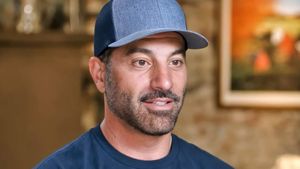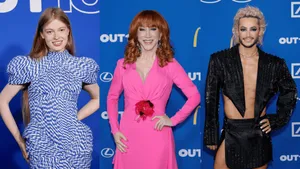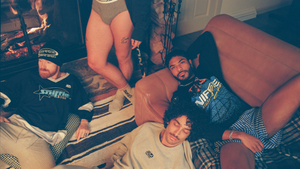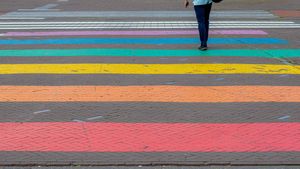A photo booth set with faux lockers, backpacks, queer stickers, and various high school-themed accouterments stood in the center of the event space at Los Angeles's NeueHouse. Bars lined with boxes of Gummi Bears, Dots, Red Vines, and popcorn (sweet or salty -- you choose) framed the room. On the screen, just minutes before the premiere of Hulu's hilarious and adorable queer rom-com Crush, was a still from the movie featuring its queer stars Auli'i Cravalho and Rowan Blanchard.
The room brimmed with joyful young LGBTQ+ people whose gender and sexual identities appeared to fill the spectrum. They were in glam makeup, killer boots or heels, and sartorial excellence -- the expansive choices of suits alone made me wish I were a young queer person again. The fabulously gay evening featuring a film from an all-LGBTQ+ creative team, writers Kirsten King and Casey Rackham and director Sammi Cohen, was celebratory and unthinkable 35 years ago when I came out. I was inspired by the unapologetic young audience with their queerness proudly placed front and center. I wished I were them in that moment.
Then, after that bliss, I couldn't reconcile the reality of increased queer visibility with the right wing's craven attacks on LGBTQ+ people, especially youth. There are more than 300 anti-LGBTQ+ bills in the works throughout the country. Many of those cruelly target the vulnerable transgender population, and others seek to erase queer people altogether with the removal of our stories from school libraries and laws like Florida's "don't say gay" that ban discussing our existence in the classroom. Members of this proud queer generation find themselves in confusing and scary times.
It's not just what's happening in the classrooms, though. The Supreme Court decision that overturned Roe v. Wade imminently threatens queer people who can become pregnant. The war on young (and all) queer people doesn't stop there. Justice Samuel Alito's leaked opinion cited Obergefell v. Hodges (2015), the case that made marriage equality the law of the land, and Lawrence v. Texas (2003), which overturned anti-sodomy laws, effectively decriminalizing queer sex. That Alito sought to include those cases as examples of overreach in his Dobbs v. Jackson Women's Health Organization opinion that could overturn Roe spells a long battle ahead for LGBTQ+ folks.
In my life, I've marched to demand that Ronald Reagan (who was pandering to a band of antigay evangelicals) act on HIV and AIDS as the epidemic was decimating my queer brothers. I've shouted about hate-crimes legislation and fought for civil unions, second-parent adoption rights, and marriage equality. For a brief shining moment when marriage equality was approved in 2015 and President Barack Obama was in the White House, I had hope. It was my Camelot moment. And then Donald Trump happened. I don't need to enumerate how he and the party that foisted him to power have harmed marginalized people across the board. But battles are cyclical. We fight, we gain some movement (maybe freedom), we backslide, we party, we protest, we watch Carol again (at least that's how I cope).
In our cover story for our Politics and Advocacy issue, writer Christopher Wiggins explores how Republicans and right-wing conspiracy theorists use queer kids as cudgels to claw their way back to power and how they're painting adult LGBTQ+ people as groomers to instill fear in their base. The story checks in with the heads of organizations that bolster LGBTQ+ youth that the right wing is now targeting -- people like the Trevor Project's Amit Paley and GLSEN's Melanie Willingham-Jaggers. Equally important and featured in our story is the work of young activists like trans teen Alex Rambow, whose efforts in South Dakota could very well save lives.
In a first-of-its-kind collaboration with Google, we've named 20 Advocates for Change, queer people who've documented their daily lives using the Google Pixel 6 phone. Our cover stars, LGBTQ+ youth activists and artists Zoey Luna, Sameer Jha, and Myles Mugler, along with trans swimmer Schuyler Bailar, the National LGBTQ Task Force's Kierra Johnson, wrestler Sonya Deville, and more give us a glimpse into what goes into their activism in front of and behind the camera using Google's hot new tech.
Amid the marches and policy battles, we know we must celebrate ourselves. Queer joy is as integral to our flourishing as is taking to the streets. We at the Advocate hope that this story of LGBTQ+ determination, grit, and joy illustrated by photo diaries of 20 Advocates for Change inspires you to continue to share your beautiful selves with the world. And if it's not possible to let your Pride flag fly where you currently are, we hope that seeing how others have overcome and risen helps you feel less alone and realize you're part of a community that stands with you.
Yours in Storytelling,
Tracy E. Gilchrist (Editor in Chief, The Advocate)
This story is part of The Advocate's 2022 Advocacy and Politics issue, which is out on newsstands July 18, 2022. To get your own copy directly, support queer media and subscribe -- or download yours for Amazon, Kindle, Nook, or Apple News.





































































Charlie Kirk DID say stoning gay people was the 'perfect law' — and these other heinous quotes